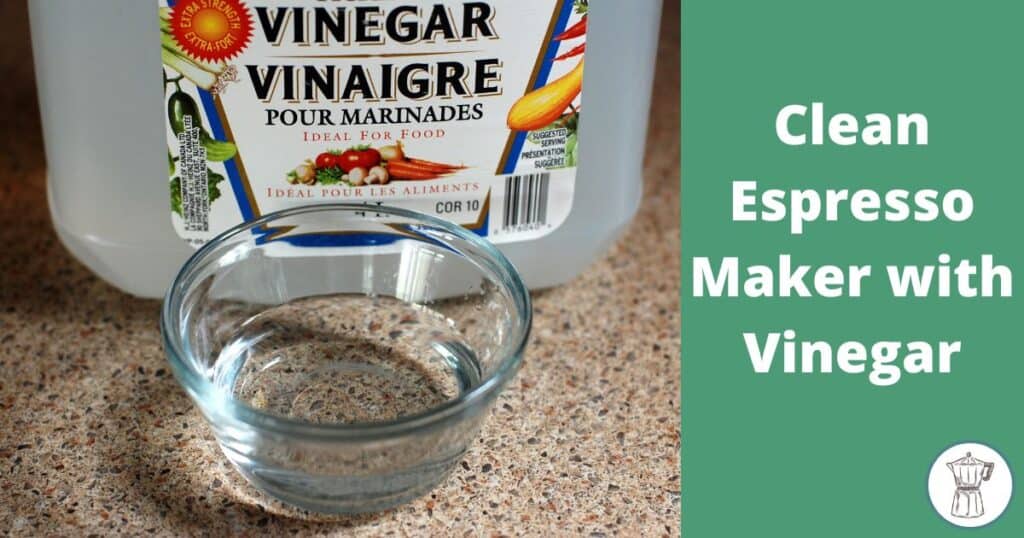Can you clean your espresso maker with vinegar?
You’ve probably seen information about how you can clean your espresso machine with vinegar everywhere on the internet. But is true? Can you make really clean your machine thoroughly by just using an everyday product like vinegar? Stick around I’ve compiled this guide on how to clean an espresso brewer with vinegar with tips and tricks, interesting facts and more.
Let’s dive right into it.
How does an espresso machine actually work?
First things first, let’s have a look at how an espresso machine really works, so this will help us understand more about the areas of the brewer that need to be cleaned properly every time.
There are 4 core parts in an espresso machine:
- Pump
- Boiler
- Water tank
- Steam wand
If you keep these parts cleaned, you’ll prolong the lifespan of your machine and of course, the coffee you’ll be brewing is going to be delicious ever time.
How does the whole thing work?
Water from the water tank runs from the water tank to the coffee grounds section and it’s heated by the boiler. It runs through the coffee grounds sections and because it’s hot (it’s not boiled by the way as it’s 92°C – 96°C or 197°F – 205°F) it extracts the flavours and aroma of the coffee grounds and it’s brewed dripping into your cup.
The 4-step method to clean your espresso maker with vinegar
Let’s go over the 4-step method to clean your brewer by using vinegar
- Pick the right vinegar
Which type of vinegar is the best for this matter? Ideally you need to find white vinegar as it’s colourless; other colored vinegars might leave stains on your machine, so to be on the safe cide go for white vinegar. If you can’t find any, apple cider vinegar will do as well.
- Create the vinegar solution
The good news is that is dead simple to create the solution yourself; all you need to do is mix vinegar with water. But what’s the right portion for each? I suggest you go for 50% of each, so mix equal parts of each to make it powerful and effective. You can go for 1/3 water vinegar and 2/3 water to make it less strong and clean your machine twice.
- It’s time to descale your machine
Since you have your solution ready it’s high time to use it and descale your
brewer (learn how to quickly descale a Smeg espresso machine. Pour the mix into the water tank and turn the brewer on as if you were to
pull an espresso shot. The solution is going to run through the system and clean the machine and remove grease and coffee oils and lipids. Once the water runs out you’re done with the descaling process.There’s no harm in going for a second round, especially if you haven’t descaled your espresso maker in a while. By the way, don’t use any coffee grounds when descaling your brewer – it needs to be only the solution.
- Time to rinse it
When you’re done with the descaling go ahead and rinse the machine by pouring water (fiill at least half of it) into the water tank to get rid of the smell of vinegar, otherwise the first few espressos you’re going to pull after descaling your brewer are going to taste somewhat vinegar.
How often should you clean your espresso brewer with vinegar?
It’s key to cleaning your brewer consistently.
There are two ways to work this out:
First, you can set a number of espressos you brew and clean it every time you hit this number. For example, you can set 45 espressos as a target and clean your brewer every time you reach this number.
Second, if you find it difficult to keep track of how many espresso you make you can just set a specific time for cleaning. For example, you can clean your brewer every month or every 40 days.
In this case, The choice is yours.
Which is better? Vinegar or Descaling solution?
That’s a common question that often comes up when it comes to cleaning an espresso machine.
Cleaning your espresso brewer with vinegar
The good thing with vinegar is that you can find it everywhere, just pop into the off-license near you and you’ll get some. Vinegar also is a natural product which means it doesn’t harm the environment as opposed to some descaling solutions. Plus, vinegar is cheaper to buy; the price in the US this year is $0.64-$0.67 per kilo compared to a descaling solution that might cost you at least 10 times more.
Cleaning your espresso brewer with a descaling solution
Vinegar is great for your machine, but it do so much for your machine. If you really aim to clean your machine thoroughly it’s wise to spend a little bit more and buy a proper good descaling solution; you can find a decent one for $13.99-$29.99. Plus, you can even find a descaling solution specifically designed for your brewer (the majority of espresso manufacturers create their own ones), meaning that you can clean your espresso machine and make it look shiny.
How to clean your espresso maker with citric acid and lemonade
Citric acid and especially sugar-free lemonade is a great alternative to vinegar.
Citric acid is pretty good as it’s low pH level (3-6) kills bacteria, mildew and mould, making it easy for your to keep your brewer in boss condition.
But how do you use it?
The way you use it is pretty similar to vinegar; just mix 1 tsp of citric acid with about a cup of hot water and pour it into the water tank of your machine. Get the machine started without adding any coffee grounds.
To clean the surface of your brewer with citric acid, just dip a cloth into the mix and wipe all over your machine. Then wipe it with a cloth wet with hot water and finally use kitchen roll or a dry cloth to wipe it. If you own a Wolf coffee machine it’s vital to know how to descale it.
Let’s wrap it up
If you would just vinegar for dressing on your chips or even salad you have one more good way of using it and cleaning your espresso brewer. So it’s a good idea to nip out and buy some more extra vinegar cause you’ll sooner or later need it. Read our guide on how to clean a Krups espresso maker. Or read how to clean your stovetop espresso maker or even how to clean Philips espresso machine.

- How to Remove Coffee Stains From Countertop The Easy Way - December 21, 2023
- Can You Reuse Coffee Grounds in French Press? Truth Inside - December 12, 2023
- Can Expired Coffee Creamer Make You Sick? 3 Ways to Find Out - December 9, 2023
